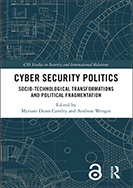Cyber Security Politics: Socio-Technological Transformations and Political Fragmentation

Author(s): Farzaneh Badiei, Marie Baezner, Matteo E. Bonfanti, Aaron F. Brantly, Sean Cordey, Myriam Dunn Cavelty, Jacqueline Eggenschwiler, Johan Eriksson, Giampiero Giacomello, Miguel Alberto Gomez, Karl Grindal, Jasmin Haunschild, Islam Jusufi, Marc-André Kaufhold, Brenden Kuerbis, Jon R. Lindsay, Amir Lupovici, Milton Mueller, Christian Reuter, Wolf J. Schünemann, Danny Steed, Stefan Steiger, Andreas Wenger, Christopher Whyte
Editor(s): Myriam Dunn Cavelty, Andreas Wenger
Series Editor(s): Andreas Wenger
Series: CSS Studies in Security and International Relations
Publisher(s): Routledge
Publication Year: 2022
Publication Place: Abingdon, United Kingdom
